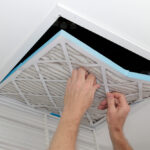If you’re a long-time homeowner or even an involved renter, chances are you’re well aware of your home’s HVAC filters and the role they play in everything from air quality to air flow, system efficiency and more. And if you’re someone who suffers from allergies, or if such a person lives in your home, filters take on even greater importance.
At Action Plumbing, Heating, Air & Electric, we’re here to offer numerous furnace and air conditioner tune-up, repair and replacement services – many of which involve your filter in some way, whether it’s for a simple replacement or a recommendation of a different filter type. We’ve assisted many homeowners who deal with allergy concerns in their home, whether themselves or someone else, and how filters and related HVAC needs might differ in these homes. Here’s a primer on everything you should know about air filters and allergies, plus a few additional tips to ensure you’re in a good spot throughout the year, particularly during seasons like the spring where allergy symptoms are high.
Air Filter Basics
Firstly, let’s quickly define HVAC air filters for those who have not become familiar with them to this point. HVAC filters are usually made from a spun fiberglass material that will be framed in a cardboard setup, though some lesser versions will also be made from cloth or pleated paper. The final appearance will be a thin, rectangular box shape with cardboard around the outside.
The goal of this fiberglass material, or the cloth/paper in other settings, is to catch contaminants and particles that are harmful to health before they enter your breathing air. These contaminants include dirt, dust, mold spores, lint, hair, fibers, bacteria and several potential others, each of which can create or exacerbate respiratory issues or other health concerns in some cases. And as those who suffer from allergies are well aware, several of these contaminants are also primary allergens that tend to cause symptoms.
Not Created Equal
Now, it’s vital to note that not all air filters are created equal. Specifically, filters will be separated in quality using a metric called MERV rating, or minimum efficiency reporting value – the MERV scale ranges from 1 to 16, with higher numbers indicating that the filter catches a higher range of contaminants.
For most homes, MERV ranges for ideal filtration will be in the 6-8 area. Those in the 9-12 range will capture even more; anything above 12 is really not necessary in a home, even for those with severe allergies, and will just cost you more for benefits you don’t really receive (these kinds of filters are used in certain industrial applications). If you have allergy sufferers in your home, it’s generally good to go with a higher-MERV filter.
Filters for Allergies
In addition, many HVAC professionals will recommend that you purchase air filters specifically designed to fight allergies. Some common allergens are microscopic particles, the kind that might even be able to sneak through normal filter sizes – but there are also air filters designed to block these allergens as well, typically those with higher MERV ratings. If allergies are a major concern for someone in the home, ask our HVAC pros for recommendations on an ideal filter.
Filters That Won’t Work
On the flip side of this coin, there are certain filter types that absolutely will not work for preventing allergy risks. Particularly, paper filters that might be used in some furnaces or ACs are only meant to prevent larger particles, like dust, from getting into components like the motor, fan, and others – they are not meant to block allergens.
On the flip side, filters known as HEPA filters – high-energy particulate air filters, that is – trap much smaller particles, including allergens. These are the fiberglass filters we referenced above, and when allergies are a concern, these are usually the ones you should be targeting. Again, our HVAC pros will be happy to recommend the best option here depending on your needs.
Replacement Considerations
Another important theme to keep in mind if you or someone else in your home has allergies is the frequency with which filters will need to be replaced. The key here: Frequency will increase.
Compared to standard paper filters, which we went over above, HEPA filters require being changed out more often. This is especially true during specific allergy season like spring and fall, at which points more allergens might collect that clog up the filter over time. A clogged filter is not only less effective, but it will also create issues with air flow and make your system less efficient overall. For this reason and for optimal air quality, you should be changing filters at least once a month for HEPA options, and maybe more often during allergy season itself.
Maintenance Themes
Now, filters aren’t the only important factor for homeowners looking to limit allergens in their air. Another major factor: Cleaning and updating your HVAC system at least once a year, and more commonly twice a year during transitional seasons (spring and fall). This is one area that’s generally included in our seasonal inspection services, which also include basic maintenance and upkeep – ensuring the system is in great shape throughout the year will stop allergens like dust, mold and pollen from building up on equipment over times. In addition, our pros can recommend basic DIY inspection or other use areas that you can follow through the rest of the year.
For more on the importance of air filters in homes with allergy sufferers, or to learn about any of our plumbing or HVAC services, speak to the staff at Action Plumbing, Heating, Air & Electric today.


